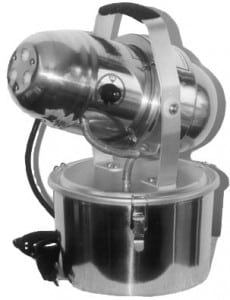 One little bug is an annoyance. Ten insects become more of a concern. But more than a dozen bugs here, there and everywhere is a problem – one that must be taken care of quickly no matter what the nature of your business is.
One little bug is an annoyance. Ten insects become more of a concern. But more than a dozen bugs here, there and everywhere is a problem – one that must be taken care of quickly no matter what the nature of your business is.
While your first instinct may be to grab the nearest fly swatter, bee trap or bug spray, employees can’t really be killing insects in full view of customers. It’s unsightly and will give customers a wrong impression about the business and how it operates.
If you have a serious problem with insects, you may want to consider employing the services of a commercial bug fogger. These products contain chemical pesticides that are released all at one time in an isolated area. Typically they are used to treat hard to get rid of insects that hide in small crevices like cockroaches, fleas and bed bugs.
For more on bug foggers, follow these simple tips:
Evaluate the problem. Before deciding whether or not to use a fogger, walk around your business and evaluate where you stand with the bugs. A fogger is designed to address a major infestation; it is not for just a few miscellaneous insects flying around. It is a serious response to a serious situation.
It’s a good idea to see what you can do to eliminate the problem in other ways first. If furniture and appliances haven’t been moved in while for a cleaning, tackle the chore now. Try and pinpoint where the infestation is coming from and use some traditional methods of pest control first.
Purchase a quality product. Since you want the problem taken care of the first time, choose a proven product. The Commander Tri-Jet Fogger leaves environments pest-free up to 30 feet in your chosen direction. It works indoors or outdoors with oil- or water-based solutions. Use it in conjunction with the Fogger Timer, a 1-hour timer, for best results.
Prep the area. A bug fogger will take care of the problem quickly, efficiently and quietly, but some advance planning is required. According to the Environmental Protection Agency (EPA) Web site, fogger should be kept away from all possible ignition sources, such as pilot lights, open flames and even sparks from an appliance that kicks in on a regular basis, such as a refrigerator. The EPA suggests that if you need help with extinguishing pilot lights to contact your local gas utility or management company.
For this reason, the EPA also states that bug foggers should not be used in tight, enclosed areas such as a closet or cabinet. This is because a buildup of flammable vapors could occur and result in injury to people or pets or damage to property.
Carefully decide what size of bug fogger to use based on the square footage of your business.
Always, always thoroughly read the instruction pamphlet that comes with the product before taking any action!
Leave the area. Before you employ any bug fogger, you must notify any employees or tenants about your plans because the property must be vacated in the advance and no one can enter the premises during this time. It’s important to post signs alerting people about the possible dangers and close the business and lock it up tight so accidental exposure doesn’t become an issue.
Remove any pets and uncovered food from the treated area and always leave immediately after starting the bug fogger as breathing in the fumes can cause illness.
Stay away from the property for the time period specified on the product instruction sheet. Upon return, open doors and windows to assist with ventilation of any remaining fumes.
Turn to the professionals. If you have a more serious problem or decide that you want some assistance, call in a professional exterminator.
Prevent future problems. The best way to fight an insect invasion is to prevent it from happening in the first place. Examine your property and destroy breeding sites, put deep cleaning and maintenance systems in place and remove any sources of food and water that the bugs are living on. Make pest control a priority and you’ll be richly rewarded with a pest-free environment. In addition, you can drastically reduce the amount budgeted for pest control and save money in the long run.






My spouse and Istumbled over here coming from a different web address and thought
I should check things out. I like wht I see so nnow
i’m following you. Look forward to checking out your web page for a second time.